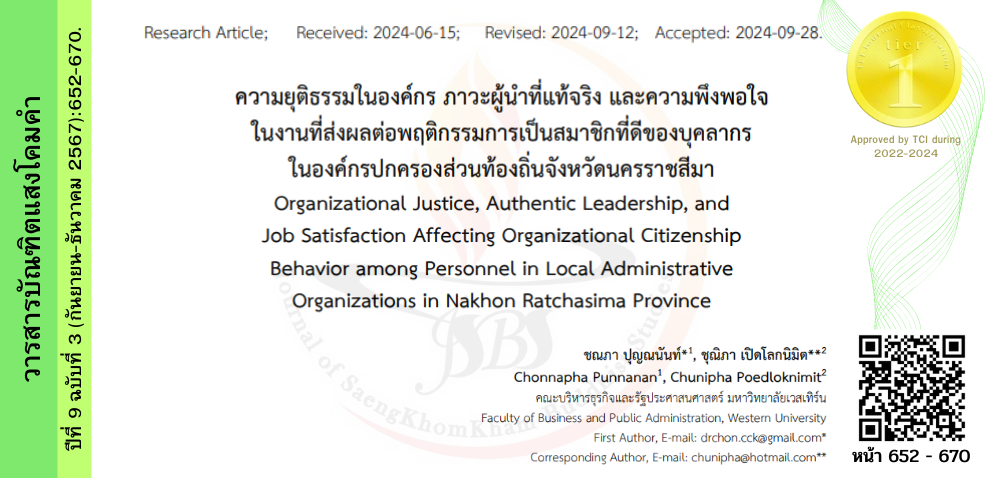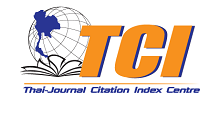ความยุติธรรมในองค์กร ภาวะผู้นำที่แท้จริง และความพึงพอใจ ในงานที่ส่งผลต่อพฤติกรรมการเป็นสมาชิกที่ดีของบุคลากร ในองค์กรปกครองส่วนท้องถิ่นจังหวัดนครราชสีมา
คำสำคัญ:
ความยุติธรรมในองค์กร, ภาวะผู้นำที่แท้จริง, ความพึงพอใจในงาน, พฤติกรรมการเป็นสมาชิกที่ดี, องค์กรปกครองส่วนท้องถิ่นบทคัดย่อ
บทความวิจัยนี้มีวัตถุประสงค์เพื่อ 1) ศึกษาความยุติธรรมในองค์กร ภาวะผู้นำที่แท้จริง ความพึงพอใจในงานที่ส่งผลต่อการเป็นสมาชิกที่ดี 2) พัฒนาโมเดลความสัมพันธ์เชิงสาเหตุของตัวแปรความยุติธรรมในองค์กร ภาวะผู้นำที่แท้จริง ความพึงพอใจในงานที่ส่งผลต่อพฤติกรรมการเป็นสมาชิกที่ดี 3) ตรวจสอบความสอดคล้องของโมเดลความสัมพันธ์เชิงสาเหตุของตัวแปรความยุติธรรมในองค์กร ภาวะผู้นำที่แท้จริงและความพึงพอใจในงานฯ กลุ่มตัวอย่าง คือ บุคลากรในองค์กรปกครองส่วนท้องถิ่นในจังหวัดนครราชสีมา จำนวน 800 คน ใช้แบบสอบถามในการเก็บข้อมูล วิเคราะห์ข้อมูลด้วยความถี่ ร้อยละ ค่าเฉลี่ย ส่วนเบี่ยงเบนมาตรฐาน และการวิเคราะห์โมเดลสมการโครงสร้าง
ผลการวิจัยพบว่า 1) บุคลากรรับรู้ความยุติธรรมในองค์กร ภาวะผู้นำที่แท้จริง ความพึงพอใจในงานที่ส่งผลต่อการเป็นสมาชิกที่ดีในระดับสูง (=3.68; S.D.=0.39) 2) โมเดลความสัมพันธ์เชิงสาเหตุของตัวแปรความยุติธรรมในองค์กร ภาวะผู้นำที่แท้จริง ความพึงพอใจในงานที่ส่งผลต่อพฤติกรรมการเป็นสมาชิกที่ดีของบุคลากรในองค์กรปกครองส่วนท้องถิ่นมีความสอดคล้องกับข้อมูลเชิงประจักษ์ (Chi-Square=94.81; df=86; GFI=0.97; AGFI=0.95; RMSEA=0.018) 3) การตรวจสอบความสอดคล้องของโมเดลความสัมพันธ์เชิงสาเหตุของตัวแปรความยุติธรรมในองค์กร ภาวะผู้นำที่แท้จริง ความพึงพอใจในงานที่ส่งผลต่อพฤติกรรมการเป็นสมาชิกที่ดีพบว่า ภาวะผู้นำที่แท้จริงและความพึงพอใจในงานมีอิทธิพลทางตรงต่อพฤติกรรมการเป็นสมาชิกที่ดีอย่างมีนัยสำคัญ โดยภาวะผู้นำที่แท้จริงมีอิทธิพลสูงสุด ส่วนความยุติธรรมในองค์กรมีอิทธิพลทางตรงต่อพฤติกรรมการเป็นสมาชิกที่ดีอย่างไม่มีนัยสำคัญ องค์ความรู้จากการวิจัย คือ ภาวะผู้นำที่แท้จริงเป็นปัจจัยสำคัญที่มีอิทธิพลต่อการส่งเสริมพฤติกรรมการเป็นสมาชิกที่ดี หากผู้นำมีความตระหนักรู้ในตนเอง มีความโปร่งใส มีจริยธรรม และมีการประมวลผลอย่างสมดุลจะจูงใจผู้ใต้บังคับบัญชาให้เป็นสมาชิกที่ดีและทุ่มเทในการทำงานเพื่อองค์กร นอกจากนี้ ความพึงพอใจในงานยังส่งผลให้บุคลากรมีความพึงพอใจในงานสูง มีแนวโน้มที่จะให้ความร่วมมือและช่วยเหลือองค์กรด้วยความเต็มใจ เมื่อพิจารณาปัจจัยทั้งสามร่วมกันพบว่า สามารถอธิบายและทำนายพฤติกรรมการเป็นสมาชิกที่ดีได้ถึงร้อยละ 95
Downloads
เอกสารอ้างอิง
กรมการปกครอง กระทรวงมหาดไทย. (ม.ป.ป.). สถิติจำนวนแยกตามส่วนกลาง/ภูมิภาค. สืบค้นเมื่อ 15 เมษายน 2567, จาก https://multi.dopa.go.th/dopaperson/assets/modules/official_letter/uploads/67876ae1d19ca7eb458a22b3b12f67386684c1661a72f6178972729016390097.pdf
นิตยา แหยมเจริญ และกฤษดา เชียรวัฒนสุข. (2560). ความสัมพันธ์ระหว่างรูปแบบภาวะผู้ตามที่มีความกล้าหาญ พฤติกรรมในการเป็นสมาชิกที่ดีและประสิทธิภาพการปฏิบัติงาน. ใน เอกสารการประชุมผลงานการวิจัยและวิชาการนวัตกรรมธุรกิจและการเป็นผู้ประกอบการ, หน้า 118-134. ปทุมธานี: มหาวิทยาลัยรังสิต.
พระมหาสุริยะ มทฺทโว และคณะ. (2564). การประยุกต์หลักสาราณียธรรมเพื่อส่งเสริมความผูกพันต่อองค์กรของบุคลากรเทศบาลในจังหวัดนครราชสีมา. วารสาร มจร สังคมศาสตร์ปริทรรศน์. 10 (2), 263-276.
Adams, J. S. (1965) Inequity in Social Exchange. Advances in Experimental Social Psychology. 2, 267-299.
Baquero, A. (2023). Authentic Leadership, Employee Work Engagement, Trust in the Leader, and Workplace Well-Being: A Moderated Mediation Model. Psychology Research and Behavior Management. 16, 1403–1424.
Bollen, K. A. (1989). Structural Equations with Latent Variables. New York: John Wiley & Sons.
DeVellis, R. F. (2017). Scale Development: Theory and Applications, 4th ed. Thousand Oaks: Sage Publications.
Donglong, Z., et al. (2020). The Structural Relationship between Organizational Justice and Organizational Citizenship Behavior in University Faculty in China: The Mediating Effect of Organizational Commitment. Asia Pacific Education Review. 21, 167-179.
Farid, T., et al. (2020). The Impact of Authentic Leadership on Organizational Citizenship Behaviors: The Mediating Role of Affective- and Cognitive-based Trust. Frontiers in Psychology. 11, 1975.
Garba, O. A., et al. (2018). A Social Exchange Perspective on Why and When Ethical Leadership Foster Customer-oriented Citizenship Behavior. International Journal of Hospitality Management. 70, 1–8.
George, B., et al. (2007). Discovering Your Authentic Leadership. Harvard Business Review. 85 (2), 129–157.
George, D. and Mallery, P. (2010) SPSS for Windows Step by Step: A Simple Guide and Reference 17.0 Update, 10th ed. Boston: Pearson.
Greenberg, J. and Colquitt, J. A. (2005). Handbook of Organizational Justice. New York: Psychology Press.
Hair, J. F., et al. (2013). Multivariate Data Analysis, 7th ed. London: Pearson Education Limited.
Iqbal, S., et al. (2018). Cultivating Employees’ Communal Relationship and Organizational Citizenship Behavior through Authentic Leadership: Studying the Influence of Procedural Justice. Psychology Research Behavior Management. 11, 545–555.
Joo, B. K. and Jo, S. J. (2017). The Effects of Perceived Authentic Leadership and Core Self-evaluations on Organizational Citizenship Behavior: The Role of Psychological Empowerment as a Partial Mediator. Leadership & Organization Development Journal. 38 (3), 463–481.
Kebede, S. and Wang, A. (2022). Organizational Justice and Employee Readiness for Change: The Mediating Role of Perceived Organizational Support. Frontiers in Psychology, 13, 806109.
Kline, R. B. (2015). Principles and Practice of Structural Equation Modeling, 4th ed. New York: Guillford Press.
Locke, E. A. (1978). Job Satisfaction Reconsidered: Reconsidered. American Psychologist. 33 (9), 854–855.
Luthans, F., et al. (2003). Authentic Leadership Development: A Positive Developmental Approach. Positive Organizational Scholarship. 1, 241-261.
Organ, D. W. (1988). Organizational Citizenship Behavior: The Good Soldier Syndrome. Lexington: D. C. Heath and Company.
Özer, P. and Erselcan, C. (2023). The Role of Happiness on Job Satisfaction and Employee Performance: A Cross-cultural Research in Italy and Turkey. International Journal of Contemporary Economics and Administrative Sciences. 13 (2), 520-553.
Pan, X., et al. (2018). The Effects of Organizational Justice on Positive Organizational Behavior: Evidence from a Large-sample Survey and a Situational Experiment. Frontiers in Psychology. 8, 2315.
Qiu, S., et al. (2019). The Effects of Authentic Leadership on Trust in Leaders, Organizational Citizenship Behavior, and Service Quality in the Chinese Hospitality Industry. Journal of Hospitality and Tourism Management. 40, 77-87.
Ramalu, S. S. and Janadari, N. (2022). Authentic Leadership and Organizational Citizenship Behaviour: The Role of Psychological Capital. International Journal of Productivity and Performance Management. 71 (2), 365–385.
Riyanto, S., et al. (2021). Effect of Work Motivation and Job Satisfaction on Employee Performance: Mediating Role of Employee Engagement. Problems and Perspectives in Management. 19 (3), 162-174.
Rovinelli, R. J. and Hambleton, R. K. (1977). On the Use of Content Specialists in the Assessment of Criterion-referenced Test Item Validity. Tijdschrift voor Onderwijsresearch. 2 (2), 49–60.
Saxena, A., et al. (2019). Power and Physician Leadership. BMJ Leader. 3 (3), 92–98.
Shrestha, M. (2022). Contribution of Job Satisfaction to Organizational Citizenship Behavior: A Survey of the School Teachers of Nepal. Journal of School Administration Research and Development. 7 (1), 36–49.
Zakiy, M. (2022). The Influence of Organizational Justice Dimensions on Affective Commitment and Employees’ Counterproductive Behavior. International Journal of Human Capital Management. 6 (1), 110–123.

ดาวน์โหลด
เผยแพร่แล้ว
รูปแบบการอ้างอิง
ฉบับ
ประเภทบทความ
สัญญาอนุญาต
ลิขสิทธิ์ (c) 2024 วารสารบัณฑิตแสงโคมคำ

อนุญาตภายใต้เงื่อนไข Creative Commons Attribution-NonCommercial-NoDerivatives 4.0 International License.





